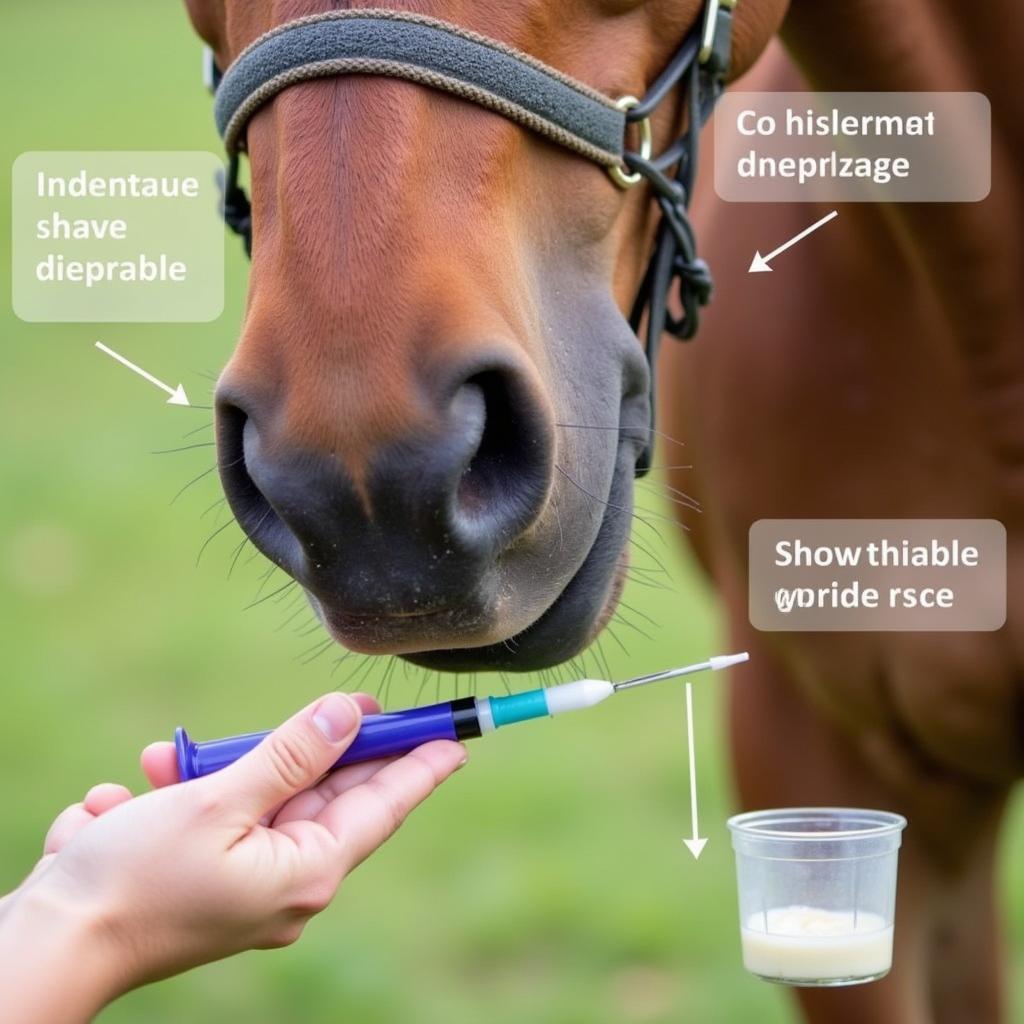Omeprazole For Horses Dosage is a critical aspect of equine health management, especially for horses suffering from gastric ulcers. Understanding the correct dosage, administration, and potential side effects is crucial for effective treatment and the well-being of your horse. This guide provides comprehensive information on omeprazole usage in horses, empowering owners to make informed decisions.
Choosing the correct omeprazole for horses dosage is crucial for effective treatment. Gastric ulcers are a common problem in performance horses, and omeprazole is often the go-to medication. But how much should you give your horse, and what factors influence the dosage?
Understanding Omeprazole and Its Uses in Horses
Omeprazole is a proton pump inhibitor that reduces the production of stomach acid. This is particularly beneficial for horses prone to Equine Gastric Ulcer Syndrome (EGUS), as it allows the stomach lining to heal. While it’s effective, administering the correct omeprazole dosage is essential. Too little may be ineffective, while too much could lead to potential side effects. After the initial treatment phase, a lower maintenance dose might be recommended by your veterinarian.
After this initial treatment, your vet might suggest switching to a lower maintenance dose of omeprazole to help prevent ulcers from recurring. It’s crucial to follow your veterinarian’s instructions precisely when it comes to both the initial treatment dose and any ongoing maintenance dose. They can tailor the omeprazole for horses dosage to your specific horse’s needs, considering factors like their weight, age, and severity of the ulcers. You can find more information on the best ulcer supplements at best ulcer supplement for horses.
Factors Influencing Omeprazole for Horses Dosage
Several factors influence the appropriate omeprazole dosage for your horse. These include the horse’s weight, age, severity of the ulcers, and the specific formulation of omeprazole being used. For instance, a young, growing horse might require a different dose than an older, more mature horse. Similarly, a horse with severe ulcers will likely need a higher dose than a horse with mild ulcers.
 Administering Omeprazole to a Horse
Administering Omeprazole to a Horse
How to Determine the Right Dosage?
Always consult with your veterinarian to determine the correct omeprazole for horses dosage. They will conduct a thorough examination of your horse and consider all relevant factors to prescribe the most appropriate dosage. Never attempt to self-diagnose or treat your horse without professional guidance.
Administering Omeprazole to Your Horse
Omeprazole is available in various forms, including paste, granules, and injectable solutions. The paste form is the most common and convenient for administration. Follow these steps for administering omeprazole paste:
- Ensure the syringe is properly filled with the prescribed dosage.
- Insert the syringe into the horse’s mouth, towards the back of the tongue.
- Depress the plunger slowly to dispense the paste.
- Ensure the horse swallows the medication.
Potential Side Effects of Omeprazole in Horses
While generally safe, omeprazole can have potential side effects in some horses. These are typically mild and can include diarrhea, loss of appetite, and changes in behavior. If you observe any unusual symptoms after administering omeprazole, contact your veterinarian immediately. Knowing the price of omeprazole can help you budget for your horse’s care. Find more information on pricing at our dedicated page: omeprazole for horses price.
Omeprazole and Other Medications
It’s essential to inform your veterinarian about any other medications your horse is currently taking, as some drugs can interact with omeprazole. This is crucial to avoid any potential adverse reactions.
Long-Term Use of Omeprazole in Horses
For horses with chronic ulcers, long-term omeprazole use may be necessary. Your veterinarian will monitor your horse’s progress and adjust the dosage as needed to maintain optimal health. If you’re looking for alternative treatment options for ulcers, you can find information about sucralfate powder at sucralfate powder for horses.
Conclusion
Understanding omeprazole for horses dosage is crucial for effectively managing gastric ulcers. Consulting with your veterinarian, following their prescribed dosage, and monitoring your horse for potential side effects are vital steps in ensuring your horse’s health and well-being. Proper management, combined with appropriate medication, can significantly improve your horse’s quality of life.
FAQ
- What is the typical omeprazole for horses dosage? The dosage varies depending on the horse’s weight and the severity of the ulcers. Always consult your veterinarian for the correct dosage.
- How is omeprazole administered to horses? It’s commonly available as a paste administered orally.
- What are the potential side effects of omeprazole in horses? Side effects are generally rare and mild, including diarrhea and loss of appetite.
- Can I give my horse omeprazole without consulting a veterinarian? No, always consult your veterinarian before administering any medication to your horse.
- How long can a horse be on omeprazole? Long-term use may be necessary for chronic cases, under veterinary supervision.
- What are other treatments for gastric ulcers in horses? Lifestyle changes and other medications like sucralfate can also be used.
- Where can I find more information on omeprazole for horses? Consult your veterinarian or reputable equine health resources.
Need further assistance? Contact us at Phone Number: 0772127271, Email: [email protected], or visit us at QGM2+WX2, Vị Trung, Vị Thuỷ, Hậu Giang, Việt Nam. Our customer service team is available 24/7. We also have resources on other related topics such as managing colic in horses and choosing the right horse feed. Explore our website for more valuable information to help you care for your equine companion.